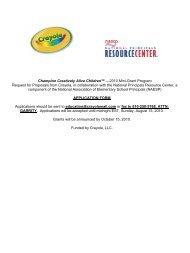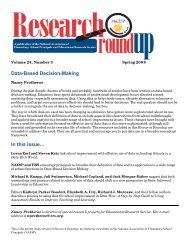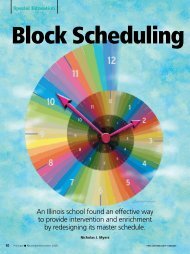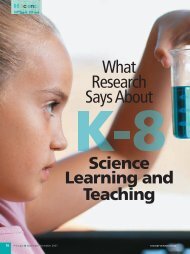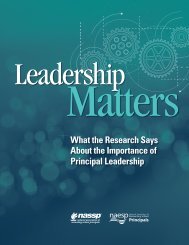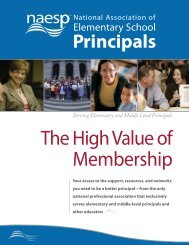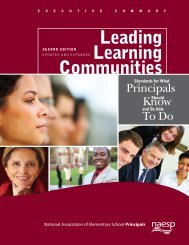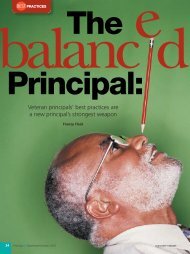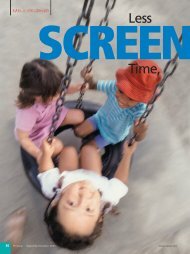The Elephant on the Playground - National Association of ...
The Elephant on the Playground - National Association of ...
The Elephant on the Playground - National Association of ...
- No tags were found...
You also want an ePaper? Increase the reach of your titles
YUMPU automatically turns print PDFs into web optimized ePapers that Google loves.
<str<strong>on</strong>g>The</str<strong>on</strong>g> <str<strong>on</strong>g>Elephant</str<strong>on</strong>g> <strong>on</strong><strong>the</strong> <strong>Playground</strong>Jill VialetEvery principal knows that recess can be hell.But it doesn’t have to be.Ask any elementary school principal what <strong>the</strong> toughest part <strong>of</strong> <strong>the</strong> dayis, and most will answer with <strong>on</strong>e word: recess. That’s because recess iswhen most trouble starts. When I asked <strong>on</strong>e principal recently aboutrecess, she promptly rattled <strong>of</strong>f a list <strong>of</strong> headaches, such as “<strong>the</strong> teasing, <strong>the</strong>fights, <strong>the</strong> bullying, <strong>the</strong> injuries, <strong>the</strong> referrals.” Brearn Wright Jr., <strong>the</strong> principalat Clark Elementary School in Washingt<strong>on</strong>, D.C., recently told me that whenit’s recess time, his job is instantly transformed into a cross between a surge<strong>on</strong>in a MASH unit and Judge Joe Brown. When Wright isn’t treating casualties <strong>on</strong><strong>the</strong> playground or sending injured students to <strong>the</strong> nurse’s <strong>of</strong>fice, he is mediatingbetween blacktop brawlers who take <strong>on</strong> <strong>the</strong> roles <strong>of</strong> plaintiff and defendant.<str<strong>on</strong>g>The</str<strong>on</strong>g> recess crisis has become <strong>the</strong> ugly secret thatno <strong>on</strong>e talks about but every principal c<strong>on</strong>fr<strong>on</strong>ts<strong>on</strong>ce or twice a day. Call it <strong>the</strong> elephant <strong>on</strong> <strong>the</strong>playground.<str<strong>on</strong>g>The</str<strong>on</strong>g> Lost Art <strong>of</strong> <strong>Playground</strong> Play<str<strong>on</strong>g>The</str<strong>on</strong>g> schoolyard has changed c<strong>on</strong>siderably sincewe were kids. If you were like me, you grew up playingfour square or kickball, te<strong>the</strong>rball, or freeze tag.<str<strong>on</strong>g>The</str<strong>on</strong>g>se were games that got us running, playing, andgenerally having a great time. We had no idea at <strong>the</strong>time that <strong>the</strong>y were actually good for us.But in <strong>the</strong> age <strong>of</strong> <strong>the</strong> Xbox and PlayStati<strong>on</strong> 3,many children come to school not really knowinghow to engage in healthy play. For those who livein rough neighborhoods, playing outdoors actuallymay be forbidden by <strong>the</strong>ir parents for safety reas<strong>on</strong>s.As a result, many kids never learn <strong>the</strong> basics <strong>of</strong>outdoor play. <str<strong>on</strong>g>The</str<strong>on</strong>g>y d<strong>on</strong>’t know how to make up andfollow rules or how to resolve c<strong>on</strong>flicts.In an all-too-comm<strong>on</strong> scenario, games devolveinto c<strong>on</strong>flict and fighting before <strong>the</strong>y even getstarted. When chaos reigns <strong>on</strong> <strong>the</strong> playground, itcan spill over into <strong>the</strong> classroom. And when childrend<strong>on</strong>’t feel safe in school, it affects <strong>the</strong>ir ability tolearn.We shouldn’t blame kids for not knowing <strong>the</strong>ABCs <strong>of</strong> playground play. It is something that canbe taught and kids have an amazing ability to learnwhen adults make even a modest effort. In fact,recess <strong>of</strong>fers <strong>the</strong> perfect opportunity to make learningto play a part <strong>of</strong> every child’s school day. Thishas <strong>the</strong> dual benefit <strong>of</strong> eliminating a major behaviormanagement problem while also making a seriousc<strong>on</strong>tributi<strong>on</strong> to children’s emoti<strong>on</strong>al, social, andphysical development.38 Principal n November/December 2008 www.naesp.org
Teaching Kids How to PlayDuring <strong>the</strong> past 12 years, I have beenc<strong>on</strong>ducting an informal experimentat more than 130 schools in six citiesto see what happens when you puttrained adults <strong>on</strong> <strong>the</strong> playground atrecess. Through Sports4Kids, we havebeen putting play experts <strong>on</strong> schoolplaygrounds to teach classic games likekickball and four square, as well as newgames designed to build leadership andfoster teamwork.<str<strong>on</strong>g>The</str<strong>on</strong>g> results have been astounding. Inschool after school, <strong>the</strong> problems thatplague recess virtually disappear and <strong>the</strong>whole school day goes more smoothlyas kids bring <strong>the</strong> c<strong>on</strong>fidence, teamwork,and c<strong>on</strong>structive problem-solving skills<strong>the</strong>y’ve learned <strong>on</strong> <strong>the</strong> playground into<strong>the</strong> classroom—and into <strong>the</strong>ir lives.What we have learned from more thana decade in <strong>the</strong> playground trenches isthat recess does not have to be hell. Not<strong>on</strong>ly is it possible to manage <strong>the</strong> chaos,but doing so can actually transform <strong>the</strong>entire school climate. This is because<strong>the</strong> same qualities that are fundamentalto safe and healthy play—teamwork,respect, and encouragement—are als<strong>of</strong>undamental to safe and healthy schools.Last year, <strong>the</strong> Open Society Institute,investigating suspensi<strong>on</strong> trends in Baltimorepublic schools, discovered thatsuspensi<strong>on</strong>s plummeted at schools thatactively took steps to rescue recess byteaching kids how to play. A recent caseRyan McVay/Getty ImagesPrincipal n November/December 200839
study by <strong>the</strong> Harvard Family ResearchProject saw similar changes in behaviorafter Sports4Kids took over <strong>the</strong> playgroundat Ohrenberger ElementarySchool in Bost<strong>on</strong>. <str<strong>on</strong>g>The</str<strong>on</strong>g> study found thatover <strong>the</strong> course <strong>of</strong> <strong>on</strong>e year, <strong>the</strong> wellfuncti<strong>on</strong>ingrecess fostered supportiverelati<strong>on</strong>ships am<strong>on</strong>g students, createdopportunities for meaningful youthinvolvement, and taught c<strong>on</strong>flict resoluti<strong>on</strong>and o<strong>the</strong>r life skills.A growing body <strong>of</strong> research and <strong>the</strong>real-life experience <strong>of</strong> principals led <strong>the</strong>Robert Wood Johns<strong>on</strong> Foundati<strong>on</strong> torecently declare recess as an undervaluedtime in schools. <str<strong>on</strong>g>The</str<strong>on</strong>g> foundati<strong>on</strong>’s2007 report, “Recess Rules,” highlightsdata that makes <strong>the</strong> case for focusing <strong>on</strong>recess <strong>on</strong> behalf <strong>of</strong> children’s health.<str<strong>on</strong>g>The</str<strong>on</strong>g> bottom line is that no principalshould feel powerless <strong>on</strong> <strong>the</strong> playgroundor feel that eliminating recess is<strong>the</strong>ir <strong>on</strong>ly choice. It is not <strong>on</strong>ly possiblebut essential to replace <strong>the</strong> chaos witha positive alternative. And principalswho dedicate even modest energy andresources into rescuing recess will berewarded with happier and healthierschools.Resuscitating Recess:A Five-Point PlanHere are five things you can do torescue recess at your school:Map your schoolyard. <str<strong>on</strong>g>The</str<strong>on</strong>g> first stepis to take a good look at <strong>the</strong> assets andliabilities <strong>of</strong> your play area by observing<strong>the</strong> current patterns <strong>of</strong> play:n What games are <strong>the</strong> kids playing?n What parts <strong>of</strong> <strong>the</strong> schoolyard are<strong>the</strong>y using?n How do students make <strong>the</strong> transiti<strong>on</strong>sfrom cafeteria to schoolyardand back inside?n Where do kids who aren’t participatingstand?n Is structured play being used?n What are <strong>the</strong> adults doing?Once you have a sense <strong>of</strong> what’sgoing <strong>on</strong>, imagine what you’d like tosee. Take a piece <strong>of</strong> paper and draw arough sketch <strong>of</strong> your schoolyard dividedinto five or six different areas. Create anarea for <strong>the</strong> Game <strong>of</strong> <strong>the</strong> Week, for kidswho d<strong>on</strong>’t generally participate. Selecta locati<strong>on</strong> for checking out equipmentas children flow from <strong>the</strong> cafeteria to<strong>the</strong> yard. Think about using c<strong>on</strong>es todesignate areas where kids can playbasketball and soccer. Talk with yourcustodian or facilities staff about paintinglines for four square.Teach every<strong>on</strong>e <strong>the</strong> rock-paper-scissorsgame. Nine times out <strong>of</strong> 10, playgroundc<strong>on</strong>flicts are completely inc<strong>on</strong>sequentialand with rock-paper-scissors as anagreed-up<strong>on</strong> tool for problem-solving,you will be amazed by how much moresmoothly things can go. One <strong>of</strong> <strong>the</strong> keythings about making it work is to haveevery<strong>on</strong>e use it to solve all types <strong>of</strong> disagreements.Encourage your teachersto use it in <strong>the</strong> classroom.Work with smaller groups. Teach groupsignals and game rules to a classroom orsmaller group <strong>of</strong> students. When you’revisiting classrooms, take a few minutesto teach signals like rhythmic clappingto get <strong>the</strong>ir attenti<strong>on</strong>, and explain thatyou will be using <strong>the</strong>se signals <strong>on</strong> <strong>the</strong>schoolyard at recess. Also, work withsmall groups to teach rules to games.When kids d<strong>on</strong>’t play well toge<strong>the</strong>r,it’s <strong>of</strong>ten because <strong>the</strong>y d<strong>on</strong>’t know <strong>the</strong>rules.Spend some time talking to kidsabout transiti<strong>on</strong>s. Have <strong>the</strong>m comeup with rituals for starting and endingrecess—perhaps a cheer—to help <strong>the</strong>mphysically acknowledge <strong>the</strong>y are about tochange <strong>the</strong>ir envir<strong>on</strong>ment and energylevels.Play outside yourself. Get in a game andencourage o<strong>the</strong>r adults to do <strong>the</strong> same.<str<strong>on</strong>g>The</str<strong>on</strong>g>re is no better way to engage kidswho d<strong>on</strong>’t usually participate. Childrenbehave better and feel safer when <strong>the</strong>reare grown-ups playing with <strong>the</strong>m.I know it’s obvious, but when you’replaying with kids you should model goodsporting behavior. Play hard, have fun,be supportive, and win or lose graciously.Give kids resp<strong>on</strong>sibilities. We run arecess program called Junior Coaches inwhich <strong>the</strong> oldest students distribute andcollect equipment, turn ropes for jumproping,resolve c<strong>on</strong>flicts, and help splitkids into teams. <str<strong>on</strong>g>The</str<strong>on</strong>g> junior coaches alsocan take <strong>on</strong> bigger jobs, such as organizingintramural tournaments and running<strong>the</strong> Game <strong>of</strong> <strong>the</strong> Day. You can givesimilar resp<strong>on</strong>sibilities to your existingstudent leadership groups. In our program,we try to include some childrenwho have a history <strong>of</strong> negative recessbehavior. <str<strong>on</strong>g>The</str<strong>on</strong>g>re’s a lot <strong>of</strong> natural leadership<strong>the</strong>re, and it’s much easier if <strong>the</strong>y’re<strong>on</strong> your side.Taming <strong>the</strong> <str<strong>on</strong>g>Elephant</str<strong>on</strong>g>Ultimately, we believe that <strong>the</strong> mosteffective way to resuscitate recess is toplace a trained adult <strong>on</strong> your playground.All <strong>of</strong> our site coordinators have experiencein working with children and aretrained in methods <strong>the</strong>y can use to create40 Principal n November/December 2008www.naesp.org
a structured, safe, and inclusive playground envir<strong>on</strong>ment.If you aren’t currently in a city where Sports-4Kids operates, you can designate existing or newstaff to run recess, and we will help you train <strong>the</strong>m.Recess may pale in importance when held upagainst <strong>the</strong> competing demands <strong>of</strong> boosting testscores and raising students’ academic achievement.But after more than a decade <strong>of</strong> workingwith principals to replace chaos with cooperati<strong>on</strong>in <strong>the</strong> schoolyard, and to transform recess into anintegral and positive force in each child’s development,I am even more c<strong>on</strong>vinced that it pays to not<strong>on</strong>ly acknowledge <strong>the</strong> elephant <strong>on</strong> <strong>the</strong> playground,but to teach it some new and—in some cases—oldtricks. PJill Vialet is <strong>the</strong> founder and president <strong>of</strong> Sports4Kids.Her e-mail address is jill@sports4kids.org.Web Resources“Squeezing in Recess: Easier for Some, No SmallFeat for O<strong>the</strong>rs,” is a September 2006 Communicatorarticle that discusses <strong>the</strong> difficulty some principalsface in finding <strong>the</strong> time to schedule recess forstudents given <strong>the</strong> pressures <strong>of</strong> state and federalrequirements associated with adequate yearlyprogress and <strong>the</strong> No Child Left Behind Act.www.naesp.org<str<strong>on</strong>g>The</str<strong>on</strong>g> missi<strong>on</strong> <strong>of</strong> Sports4Kids is to improve <strong>the</strong>health and well-being <strong>of</strong> children by increasingopportunities for physical activity and safe,meaningful play. View a 10-minute documentaryabout a St. Louis elementary school before and afterSports4Kid’s program was introduced.www.sports4kids.orgThis research brief from Active Living Research<strong>of</strong>fers a summary <strong>of</strong> peer-reviewed research about<strong>the</strong> relati<strong>on</strong>ship between physical activity andchildren’s academic performance.www.rwjf.org/pr/product.jsp?id=23456 www.naesp.org Principal n November/December 200841



